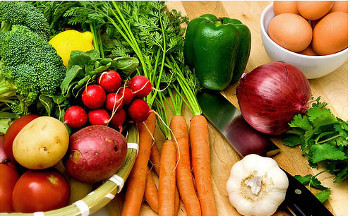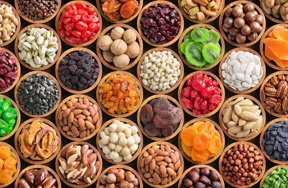There are many ethical, cultural, spiritual and health-related reasons why you or people you know may choose to not eat certain animals and or animal products and take on a plant-based diet. There are some major differences in diet to be taken into consideration if you’re thinking of being vegetarian or vegan, so it’s a good idea to learn the difference between the two. Find out more in Vegetarians versus Vegans!
 Vegetarians and Vegans have a plant-based diet.
Vegetarians and Vegans have a plant-based diet.
Vegetarianism
If you’ve ever wondered what exactly a vegetarian is, the short answer is someone who tries to refrain from eating meat, including poultry (chicken), red meat (beef and lamb), and seafood . Vegetarians often have ethical and moral concerns about the rights of animals and the way food animals are treated, the effects of animal farms and meat packing plants on our planet and in many religions (like Buddhism and Hinduism) the spiritual implications of eating another living thing. For some people it’s a matter of health, and adopting a vegetarian diet is their best bet for getting in shape.
There are different levels of vegetarianism, some people simply don’t eat poultry and red meat while others stay away from animal products like eggs. Everyone is different, and meat is a quick and easy fix in most of our diets for many essential nutrients and protein, but it is considered safe and a great to live by many people, so if you’re thinking of giving up meat it’s important to let your doctor know so that you can find the best type of vegetarianism for you! I Here are a few different ways to be vegetarian:
- Pescatarian: These vegetarians still include fish and seafood in their diet.
- Ovo-Lacto: Vegetarians that keep dairy and eggs in their diet.
- Ovo: Vegetarians that continue to eat eggs but no other meat.
 Vegans stay away from meat, dairy and animal products
Vegans stay away from meat, dairy and animal products
Veganism
There is a big difference between being vegetarian and being vegan, although ethically people choose these two dietary lifestyles with a similar concern for animal welfare. Vegans are much stricter in their diets than vegetarians, not only staying away from meat entirely, including no fish and no eggs, but also and products derived from animals like dairy and honey. The word vegan was originally coined by serious vegetarians in the 1800s who wanted to differentiate themselves from less strict vegetarians who still consumed dairy and eggs. Some vegans believe so strongly that their avoidance of animal products goes beyond their eating habits and they also avoid buying things made with animal products (like leather). There are lots of restaurants and businesses that cater to vegans specifically, but it is still much harder to do than to be vegetarian, requiring much planning and thought.
Fun Facts!
- 1 million Americans (or 0.5% of the population) are Vegan
- Vegan and Vegetarian diets are higher in vitamins and some minerals and are considered healthier
- Vegetarian and Vegan diets are medically associated with lower obesity risk
- The first Vegetarian Society was founded in England in 1847
- Portland, Seattle, San Francisco and New York are the most veggie friendly cities in the States and Vancouver and Toronto in Canada
- Tofu is a popular vegetarian/vegan replacement for meat
- At 200 million, India has the highest number of vegetarians in the world
Have Your Say
Would you consider becoming vegetarian or vegan? Let us know in the comments section below.

































